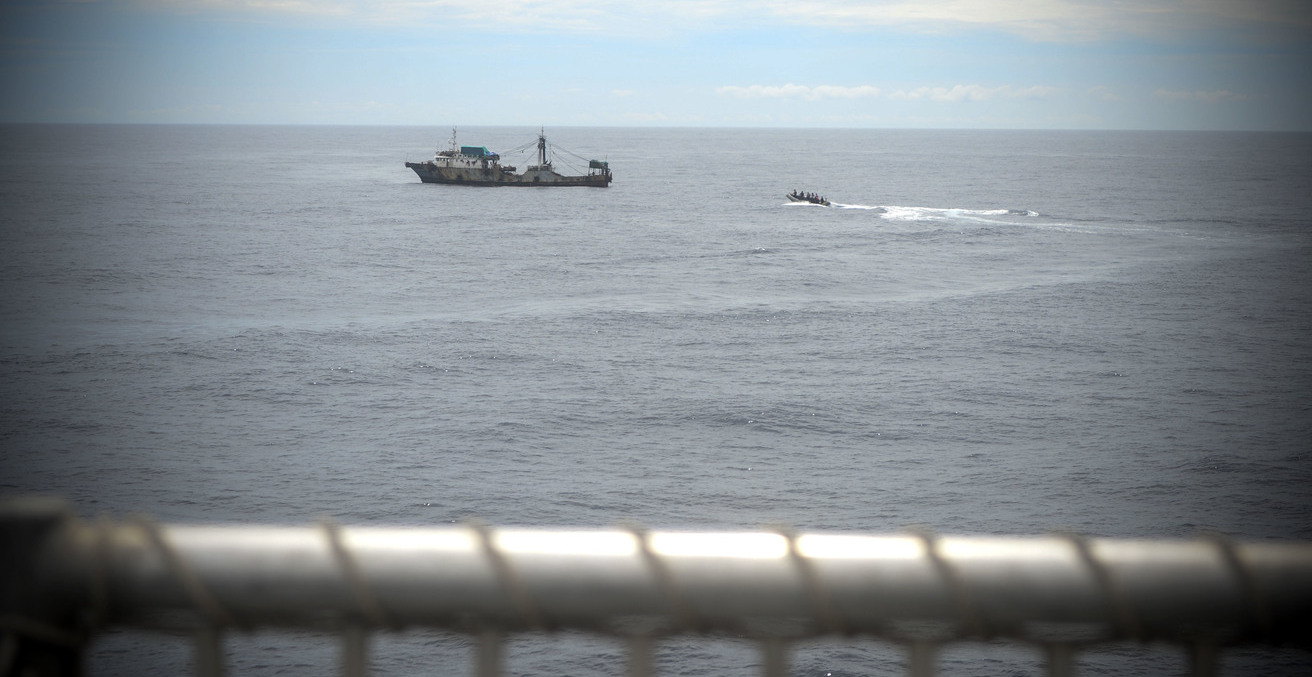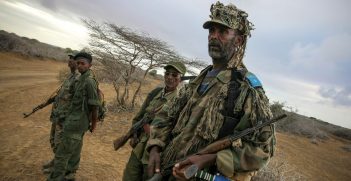Treating the Symptoms Not the Disease: Issues in Contemporary Counter-Piracy Measures

Modern piracy constitutes a real threat to maritime trade, security, and the global economy. Current anti-piracy measures are outdated and ineffective in combating this issue.
Somali Piracy
Beyond the toll of human lives, the World Bank estimates that Somali piracy at its height in the early 21st century cost the global economy close to US $18 billion a year. Somalia’s weak state institutions and rampant corruption left national waters unmonitored and undefended. Foreign vessels exploited this fact, undertaking illegal, unreported, and unregulated fishing operations. In response, coastal communities began to issue their own fishing licenses and attack those who had not paid their fees, which evolved to boarding vessels and demanding ransoms.
In 2005, the United Nations Security Council (UNSC) unanimously passed Resolution 1816, which authorised the deployment of multinational armed forces to Somali territorial waters to forcibly repress acts of piracy and maritime robbery by “all means necessary.” Like the “war on drugs,” the “war on piracy” did not result in its disappearance but rather the emergence of a more violent and sophisticated form of piracy. Because Resolution 1816 did not address the pirates’ underlying socio-political and economic motives, they have continued to adapt and bypass international containment efforts. As a result, piracy remains a serious issue in Somali waters.
A New Epicentre
West Africa’s Gulf of Guinea has now replaced Somalia as the epicentre of piracy. Stretching from Senegal to Angola, the gulf is rich in resources. As one of the world’s richest fishing grounds, the gulf is a critical source of employment for millions of West Africans. It is also strategically important for African maritime trade, in particular the transport of crude oil and gas.
Over the last 15 years, the region has become a hotspot for maritime piracy. According to the International Criminal Court’s International Maritime Bureau (IMB), in 2020 alone 130 maritime crew members were kidnapped across 22 separate incidents. The UN Office on Drugs and Crime estimates that between 2015 and 2017, piracy cost West African economies close to $800 million annually – in addition to human costs. While lessons from Somalia should have informed contemporary counter-piracy strategies, the growing threat in the Gulf of Guinea continues to be treated as a disease rather than a symptom.
Piracy and Local Politics
Piracy has emerged as a viable economic activity in West Africa. Unemployed and impoverished young men turn to piracy because the lucrative industry provides short-term financial gains, and punishment is rare. As pirates discovered that certain companies will pay sizeable ransom fees the rate of hijackings and kidnappings increased.
However, economic gain is not the primary motivation for many pirates. The Movement for the Emancipation of the Niger Delta (MEND), a Nigerian extremist organisation, is primarily responsible for piracy in the Gulf of Guinea. MEND politically justifies its actions by exposing the exploitation and oppression of communities in the region, securing compensation for the devastating environmental degradation caused by unregulated oil production, and taking a greater share of the oil revenue distribution to invest in the community. Over time MEND has taken to stealing oil from shipping cargo and kidnapping maritime crew, and now constitutes a real threat to security and economic prosperity in the region. Yet efforts to address this piracy issue are complicated by local government inaction and international law.
Current Counter-Piracy Measures
Although the practice is as old as maritime commerce itself, defining piracy is a contentious issue. International efforts to address maritime security are chiefly conducted through Article 101 of the 1982 United Nations Convention on the Law of the Sea (UNCLOS), which defines piracy as “any illegal acts of violence or detention, or any act of depredation, committed for private ends by the crew or the passengers of a private ship or a private aircraft… on the high seas.” By limiting the mandate to actions perpetrated on the high seas and for personal gain, the current UNCLOS definition is an inadequate tool for policymakers, and does not reflect the nuances of modern piracy. Piracy committed in sovereign territories or for political gain remain outside UNCLOS jurisdiction and continues to be ineffectively resolved. This is particularly prominent in West Africa, where most acts of piracy are committed in sovereign waters.
The UNCLOS’ limited mandate, has caused issues in practice. In dealing with Somali piracy, an international assembly of naval forces was granted permission to enter sovereign waters to crack down on the issue forcefully. However, unlike in Somalia, the Gulf of Guinea is home to numerous West African states with multiple converging maritime interests. The presence of foreign naval forces would be regarded as an unwarranted encroachment of sovereignty.
The Yaoundé Code of Conduct was adopted in June 2013, following a summit in Cameroon between the heads of several regional multilateral institutions. Due to the transnational nature of piracy, this summit crafted legal architecture for a comprehensive regional effort to prevent and suppress maritime piracy and other illegal acts in the Gulf of Guinea. Born out of a need for a regional strategic approach to maritime security, the code represents an increase in African leaders’ political will to manage the security of their territorial waters. The implementation of protected safe zones around pirate hotspots, as well as the spread and improvement of best management practices like armed security, have proven effective in combating some piracy in the region.
But piracy is sporadic and not evenly distributed. Since the adoption and implementation of the Code, acts of piracy have not consistently declined. A focus on Articles 6, 7 and 8 of the Code have led to a militarised approach to counter-piracy, which does not effectively address the underlying reasons why piracy is occurring in the region. The modern view that piracy is a crime that needs to be punished inhibits efforts to address its political and economic drivers.
Looking Forward
Though there has been a recent decrease in piracy across the world, its prevalence is likely far greater than official figures suggest. As restrictions imposed by the COVID-19 pandemic ease and international trade and maritime movements return, an increase in piracy is expected. Further, the Gulf’s proximity to the Sahel region through direct and porous land borders could drive destabilisation in the region and escalate maritime insecurity, making a nuanced approach to counter-piracy more imperative than ever. Local governments require commitment and political will to address underlying symptoms of this issue and should be supported by the international community.
Targeted economic development, such as providing youth employment opportunities by expanding coastal industries and infrastructure, will decrease the number of those who look toward piracy for economic opportunities. Further, given the socioeconomic impacts of pollution and environmental degradation caused by unregulated oil production, local governments and the international community must focus on creating shared interests to secure a vibrant and ecologically responsible economy in the region. The Nigerian Petroleum Industry Bill 2021 – which sought to reform the sector by incorporating measures aimed at improving local community participation, and benefitting host communities with economic, social, and infrastructural development – is a step in the right direction for contemporary counter-piracy measures.
Jack Treston is studying a Bachelor of International Relations/Languages at the Australian National University. His research interests are Chinese foreign policy and the politics of sub-Saharan Africa. Jack is currently interning with the AIIA China Matters Fellow researching Chinese Antarctic policy.
This article is published under a Creative Commons License and may be republished with attribution.





